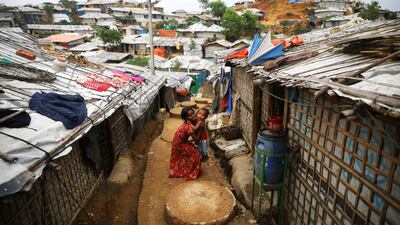The UAE has launched a major campaign to help support hundreds of thousands of Rohingya refugees forced to flee Myanmar.
The nationwide drive aims to assist those from the minority Muslim group who now find themselves in camps in India, Bangladesh and elsewhere.
Under the initiative, organisers hope to provide education, food, health services, sanitation and shelter for some of the more than 1.2 million people.
The figure includes an estimated 720,000 children, 240,000 women, and 48,000 elderly.
Announcing the campaign on Thursday, Dr Mohammed Ateeq Al Falahi, Secretary-General of the Emirates Red Crescent, highlighted the escalating predicament faced by many of the Rohingya.
"The UAE has always been proactive in its solidarity with Rohingya refugees, especially children and women, and has worked from the very first moment to support them," he said.
"There is no doubt that the consequences of the Rohingya crisis have caused a difficult reality for refugees.
“We are now in a new phase of the UAE's humanitarian response to them. This is a continuation of the previous stages and in keeping with the challenges posed by the worsening refugee situation and the escalating crisis.”
Hundreds of thousands of Rohingya fled Myanmar in 2017 in the midst of a brutal campaign of violence described by the UN as ethnic cleansing and possible genocide.
Many were from Rakhine state in the west of the country, where a military-led crackdown which claimed to be targeting militants resulted in villages razed and thousands killed.
The government of Myanmar, a predominantly Buddhist country, has refused to give the Rohingya citizenship, claiming they are illegal immigrants from Bangladesh.
"The UAE has provided considerable assistance with the onset of the crisis, especially in Bangladesh, India and some other countries,” said Fahad Abdulrahman bin Sultan, ERC Deputy Secretary-General for Development and International Cooperation.
"As a result of the reports we received from the UAE relief teams, the focus [of the new campaign] will be on women and children, especially educating the children who have been in the camps for several years without access to education.
“Women will also be assisted in education, health, shelter and food.”
Kalra's feat
- Becomes fifth batsman to score century in U19 final
- Becomes second Indian to score century in U19 final after Unmukt Chand in 2012
- Scored 122 in youth Test on tour of England
- Bought by Delhi Daredevils for base price of two million Indian rupees (Dh115,000) in 2018 IPL auction
UK-EU trade at a glance
EU fishing vessels guaranteed access to UK waters for 12 years
Co-operation on security initiatives and procurement of defence products
Youth experience scheme to work, study or volunteer in UK and EU countries
Smoother border management with use of e-gates
Cutting red tape on import and export of food
A timeline of the Historical Dictionary of the Arabic Language
- 2018: Formal work begins
- November 2021: First 17 volumes launched
- November 2022: Additional 19 volumes released
- October 2023: Another 31 volumes released
- November 2024: All 127 volumes completed
Difference between fractional ownership and timeshare
Although similar in its appearance, the concept of a fractional title deed is unlike that of a timeshare, which usually involves multiple investors buying “time” in a property whereby the owner has the right to occupation for a specified period of time in any year, as opposed to the actual real estate, said John Peacock, Head of Indirect Tax and Conveyancing, BSA Ahmad Bin Hezeem & Associates, a law firm.
UAE currency: the story behind the money in your pockets
House-hunting
Top 10 locations for inquiries from US house hunters, according to Rightmove
- Edinburgh, Scotland
- Westminster, London
- Camden, London
- Glasgow, Scotland
- Islington, London
- Kensington and Chelsea, London
- Highlands, Scotland
- Argyll and Bute, Scotland
- Fife, Scotland
- Tower Hamlets, London
PAKISTAN v SRI LANKA
Twenty20 International series
Thu Oct 26, 1st T20I, Abu Dhabi
Fri Oct 27, 2nd T20I, Abu Dhabi
Sun Oct 29, 3rd T20I, Lahore
Tickets are available at www.q-tickets.com
How much do leading UAE’s UK curriculum schools charge for Year 6?
- Nord Anglia International School (Dubai) – Dh85,032
- Kings School Al Barsha (Dubai) – Dh71,905
- Brighton College Abu Dhabi - Dh68,560
- Jumeirah English Speaking School (Dubai) – Dh59,728
- Gems Wellington International School – Dubai Branch – Dh58,488
- The British School Al Khubairat (Abu Dhabi) - Dh54,170
- Dubai English Speaking School – Dh51,269
*Annual tuition fees covering the 2024/2025 academic year
Three ways to limit your social media use
Clinical psychologist, Dr Saliha Afridi at The Lighthouse Arabia suggests three easy things you can do every day to cut back on the time you spend online.
1. Put the social media app in a folder on the second or third screen of your phone so it has to remain a conscious decision to open, rather than something your fingers gravitate towards without consideration.
2. Schedule a time to use social media instead of consistently throughout the day. I recommend setting aside certain times of the day or week when you upload pictures or share information.
3. Take a mental snapshot rather than a photo on your phone. Instead of sharing it with your social world, try to absorb the moment, connect with your feeling, experience the moment with all five of your senses. You will have a memory of that moment more vividly and for far longer than if you take a picture of it.
What is Genes in Space?
Genes in Space is an annual competition first launched by the UAE Space Agency, The National and Boeing in 2015.
It challenges school pupils to design experiments to be conducted in space and it aims to encourage future talent for the UAE’s fledgling space industry. It is the first of its kind in the UAE and, as well as encouraging talent, it also aims to raise interest and awareness among the general population about space exploration.
Our family matters legal consultant
Name: Hassan Mohsen Elhais
Position: legal consultant with Al Rowaad Advocates and Legal Consultants.
UAE currency: the story behind the money in your pockets
Company Profile
Company name: Fine Diner
Started: March, 2020
Co-founders: Sami Elayan, Saed Elayan and Zaid Azzouka
Based: Dubai
Industry: Technology and food delivery
Initial investment: Dh75,000
Investor: Dtec Startupbootcamp
Future plan: Looking to raise $400,000
Total sales: Over 1,000 deliveries in three months






